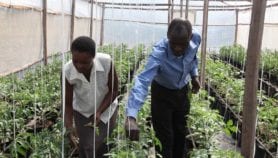Send to a friend
The details you provide on this page will not be used to send unsolicited email, and will not be sold to a 3rd party. See privacy policy.
[BONN, GERMANY] Lack of data and poor communication by scientists may be keeping land degradation and desertification off the sustainable development agenda, experts warned the UN Convention to Combat Desertification's (UNCCD) 2nd Scientific Conference last week (9–12 April).
The fear is that these challenges could cause land management issues to be under-represented in the UN's next set of development targets, the Sustainable Development Goals (SDGs), which are planned to replace the Millennium Development Goals after 2015.
"The science is not strong enough to make a case to policymakers and we need to fight to develop this area," says Sergio Zelaya, a global policy coordinator at UNCCD.
SPEED READ
- The next set of UN development goals may underplay the issue of land degradation
- Scientists need to provide evidence to show its importance
- But the situation is rapidly improving, says an expert
The shortage of case studies showing the environmental and economic causes and effects of land degradation — particularly at a local level — as well as a scarcity of indicators and targets to measure the process, make it hard for politicians to include these issues in the development agenda, he tells SciDev.Net.
His calls for more research were repeated by experts throughout the conference, including by UNCCD executive secretary Luc Gnacadja in his closing address.
The scientific community's biggest shortcoming has been its failure to frame the land degradation debate as a development issue, says Jonathan Davies, a global coordinator for the International Union for Conservation of Nature's Global Drylands Initiative, and chair of the conference's Scientific Advisory Committee.
The boost that fighting land degradation can have on development, not just on the environment, must be made clear if it is to be championed by decision-makers, particularly in the developing world, he says.
Furthermore, unlike climate change, which has rising carbon dioxide levels as a clearly defined global issue to fight against, land degradation lacks a concise target for the international community to rally around, Davies adds.
People are fighting land degradation at a national level, but so far the case has not been made strong enough for it to be viewed as a problem in need of a global strategy, he says.
But Davies says the situation has been "improving significantly" and that efforts to inform policymakers have become more effective since 2007, when the UNCCD's ten-year strategy document highlighted land degradation as a development issue.
"What we are doing differently now, is that we are showing that you cannot have any development unless you start with sustainable environmental management," he says.
The changing nature of the conversation is reflected by land degradation being clearly raised as an issue in the outcome document for last year's UN Conference on Sustainable Development (Rio+20), he adds.
Davies and Mohamed Bakarr, a senior environmental specialist for the Global Environment Facility, both see the UNCCD as central to future success.
By providing a forum to draw together the disparate strands of land degradation research through its scientific conferences, UNCCD is greatly improving conversations and collaboration, says Bakarr.
The UNCCD Secretariat, along with South Korea, will also be arranging an expert meeting this June to discuss how to push forward with a Zero Net Land Degradation recommendation for the SDGs, which would require any land lost through degradation to be matched by the restoration of other degraded areas.
It will also produce policy briefs targeted at governments and business that would evaluate existing policies and suggest changes. These will be presented at the UNCCD Conference of the Parties in Namibia in September.
These activities will allow science to be firmly embedded within the UNCCD's framework and make it a more effective body for combating land degradation, says Bakarr.
See below for a UNCCD video about land degradation:













